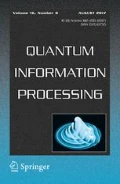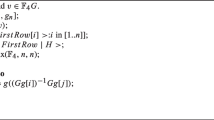Abstract
In this paper, some new classes of entanglement-assisted quantum MDS codes (EAQMDS codes for short) are constructed via generalized Reed–Solomon codes over finite fields of odd characteristic. Among our constructions, there are many EAQMDS codes with new lengths. The lengths of these EAQMDS codes may not be divisors of \(q^2\pm 1\), which are new and have never been reported.
Similar content being viewed by others
References
Ashikhmin, A., Litsyn, S., Tsfasman, M.: Asymptotically good quantum codes. Phys. Rev. A 63, 032311 (2001)
Brun, T., Devetak, I., Hsieh, M.H.: Correcting quantum errors with entanglement. Science 314, 436–439 (2006)
Calderbank, A.R., Rains, E.M., Shor, P.W., Sloane, N.J.A.: Quantum error correction via codes over GF (4). IEEE Trans. Inf. Theory 44, 1369–1387 (1998)
Calderbank, A.R., Shor, P.W.: Good quantum error-correcting codes exist. Phys. Rev. A 54, 1098 (1996)
Chen, H.: Some good quantum error-correcting codes from algebraic-geometric codes. IEEE Trans. Inf. Theory 47, 2059–2061 (2001)
Chen, J., Huang, Y., Feng, C., Chen, R.: Entanglement-assisted quantum MDS codes constructed from negacyclic codes. Quantum Inf. Process. 16, 303 (2017)
Chen, X., Zhu, S., Kai, X.: Entanglement-assisted quantum MDS codes constructed from constacyclic codes. Quantum Inf. Process. 17, 273 (2018)
Fan, J., Chen, H., Xu, J.: Constructions of \(q\)-ary entanglement-assisted quantum MDS codes with minimum distance greater than \(q+1.\). Quantum Inf. Comput. 16, 0423–0434 (2016)
Fang, W., Fu, F.: Some new constructions of quantum MDS codes. IEEE Trans. Inf. Theory 65, 7840–7847 (2019)
Fang, W., Fu, F., Li, L., Zhu, S.: Euclidean and Hermitian hulls of MDS codes and their applications to EAQECCs. IEEE Trans. Inf. Theory 66, 3527–3537 (2020)
Francisco Revson F. P.:Entanglement-assisted Quantum Codes from Cyclic Codes. arXiv:1911.06384
Guenda, K., Jitman, S., Gulliver, T.A.: Constructions of good Entanglement-assisted quantum error correcting codes. Des. Codes Cryptogr. 86, 121–136 (2018)
Jin, R., Xie, D., Luo, J.: New classes of entanglement-assisted quantum MDS codes. Quantum Inf. Process. 19, 289 (2020)
Ketkar, A., Klappenecker, A., Kumar, S., Sarvepalli, P.K.: Nonbinary stabilizer codes over finite fields. IEEE Trans. Inf. Theory 52, 4892–4914 (2006)
Koroglu, Mehmet E.: New entanglement-assisted MDS quantum codes from constacyclic codes. Quantum Inf. Process. 18, 44 (2019)
Lai, C., Ashikhmin, A.: Linear programming bounds for entanglement-assisted quantum error-correcting codes by split weight enumerators. IEEE Trans. Inf. Theory 64, 622–639 (2016)
Li, R., Xu, G., Lu, L.: Decomposition of defining sets of BCH codes and its applications. J. Air. Force Eng. Univ. (Nat. Sci. Ed.) 14, 86–89 (2013). ((in Chinese))
Lin, X.: Quantum cyclic and constacyclic codes. IEEE Trans. Inf. Theory 50, 547–549 (2004)
Lu, L., Li, R., Guo, L., Ma, Y., Liu, Y.: Entanglement-assisted quantum MDS codes from negacyclic codes. Quantum Inf. Process. 17, 69 (2018)
Lu, L., Li, R., Ma, W., Li, R., Ma, Y., Liu, Y., Cao, H.: Entanglement-assisted Quantum MDS Codes from Constacyclic Codes with Large Minimum Distance. arXiv:1803.04168
Lu, L., Li, R.: Entanglement-assisted quantum codes constructed from primitive quaternary BCH codes. Int. J. Quantum Inf. 12, 1450015 (2014)
MacWilliams, F.J., Sloane, N.J.A.: The theory of error-correcting codes. Elsevier, Amsterdam (1977)
Markus, G., Felix, H., Andreas, W.: Entropic Proofs of Singleton Bounds for Quantum Error-correcting Codes. arxiv:2010.07902
Qian, J., Zhang, L.: New optimal subsystem codes. Discrete Math. 313, 2451–2455 (2013)
Qian, J., Zhang, L.: On MDS linear complementary dual codes and entanglement-assisted quantum codes. Des. Codes Cryptogr 86, 1565–1572 (2017)
Qian, J., Zhang, L.: Constructions of new entanglement-assisted quantum MDS and almost MDS codes. Quantum Inf. Process. 18, 71 (2019)
Author information
Authors and Affiliations
Corresponding author
Additional information
Publisher's Note
Springer Nature remains neutral with regard to jurisdictional claims in published maps and institutional affiliations.
Appendix
Appendix
Proof of lemma 3.1
Denote by \(\xi =(a_{0},a_{1},\cdots ,a_{h-1})\) and \(d=\frac{s-h}{2}+1 \). The system of Eq. 3.1 can be expressed in the matrix form
where
Let \(x=g^{\mathrm{dl}-q-1}\) and
A routine calculation shows
It is obvious that \(\text {det}(A)\ne 0\) and \({\mathbf {u}}=(u_{0},u_{1},\cdots ,u_{h-1})\in (\mathbb {F}_{q^2})^h \).
Next we will show that (2) has a solution \({\mathbf {u}}=(u_{0},u_{1},\cdots ,u_{h-1})\in (\mathbb {F}^*_q)^h \). Let
It is easy to verify \(\beta _{i}^q=\beta _{h-i}\) for \(i=1,2,\cdots ,h-1.\) Assume \(\zeta =g^{\frac{q+1}{2}}\), then \(\zeta ^{q}=-\zeta .\) Raising all Eq. 3.1 to their qth powers leads to
Denote by \(\alpha =\left( a_{0},2a_{1},\cdots ,2a_{\frac{h-1}{2}},0,\cdots ,0\right) ^\mathrm{T}\). The above Eq. (6) can be reformulated as \(B{\mathbf {u}}=\alpha \) with
It is easy to verify that all the entries of B are in \(\mathbb {F}_{q}\). Suppose
Then, \(|S|=(q-1)^{\frac{h+1}{2}}\) since B is invertible. For \(0\le i\le h-1\), define
Then, the set of solutions to (6), denoted by V, is
where \({\overline{T}}=S-T\) for any subset \(T\subseteq S.\) By Inclusion–Exclusion principle,
for some \(r\ge 0.\) It follows that
Obviously \(|V|>0\). We only consider the case h is odd. The case h being even is similar and we omit the details. Therefore, there exists a solution satisfying \(u_{i}\in \mathbb {F}_{q}^{*}(i=0,1,\cdots ,h-1).\)
This completes the proof. \(\square \)
Proof of Lemma 3.3
We can calculate directly,
It suffices to show the identity
holds for all \( 0\le i,j\le \frac{q+1}{2}+ \frac{q-1}{t}-2 ,\;t \ge 2.\) It is easy to check that the identity holds if and only if \(m\not \mid qi+j+\frac{q+1}{2}\). On the contrary, assume that \(m\mid \mathrm{qi}+j+\frac{q+1}{2}\). Let
where \(\mu \) is an integer. Since \(t\ge 2\), we have \(qi+j+\frac{q+1}{2}<q^{2}-1\), which implies \(0<\mu <t\). It suffices to discuss the following two cases.
- Case 1::
-
If \(j+\frac{q+1}{2}\le q-1\), comparing remainder and quotient of module q on both sides of (7), we can deduce \(i=j+\frac{q+1}{2}=\mu \cdot \frac{q-1}{t}\). Since t is even, then \(\frac{q-1}{t}\mid \frac{q-1}{2}\). From \(\frac{q-1}{t}\mid j+1+\frac{q-1}{2}\), we can deduce that \(\frac{q-1}{t}\mid j+1\). Since \(j+1\ge 1\), then \(j+1\ge \frac{q-1}{t}\). Therefore, \(i=j+\frac{q+1}{2}\ge \frac{q+1}{2}+\frac{q-1}{t}-1\), which is a contradiction.
- Case 2::
-
If \(j+\frac{q+1}{2}\ge q\), it takes
$$\begin{aligned} qi+j+\frac{q-1}{2}=q(i+1)+\left( j-\frac{q-1}{2}\right) =q\cdot \frac{\mu (q-1)}{t}+\frac{\mu (q-1)}{t}. \end{aligned}$$In a similar way, \(j-\frac{q-1}{2}=i+1=\mu \cdot \frac{q-1}{t}\) which implies \(\frac{q-1}{t}\mid i+1\). Since \(i+1\ge 1\), then \(i+1\ge \frac{q-1}{t}\). Therefore, \(j=i+1+\frac{q+1}{2}\ge \frac{q+1}{2}+\frac{q-1}{t}-1\), which is a contradiction.
As a result, \(m\not \mid \mathrm{qi}+j+\frac{q+1}{2}\) which yields
for all \( 0\le i,j\le \frac{q+1}{2}+ \frac{q-1}{t}-2 .\) This completes the proof. \(\square \)
Rights and permissions
About this article
Cite this article
Jin, R., Cao, Y. & Luo, J. Entanglement-assisted quantum MDS codes from generalized Reed–Solomon codes. Quantum Inf Process 20, 73 (2021). https://doi.org/10.1007/s11128-021-03010-6
Received:
Accepted:
Published:
DOI: https://doi.org/10.1007/s11128-021-03010-6



